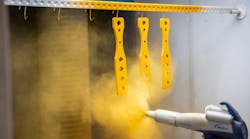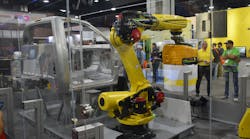The tendency now is for companies to pull back and save money, even if that means a diminishing presence in the marketplace.
Dr. Chris Kuehl, managing director of Armada Corporate Intelligence and economic analyst for Fabricators & Manufacturers Association International, said that not only is that a mistake, but it’s one that competitors should pounce on.
In a webinar, “How a Fabricator Can Survive the Recession of ‘08-09,” Kuehl said that the single best recession strategy is to exploit weaknesses.
“Competitors are making mistakes,” he said. “They are deciding to abandon territories and lines of business, and that creates disgruntled customers. If your competition suddenly stops advertising or appearing at trade shows, the customer will assume they are in bad shape and your presence is therefore reassuring. You would not believe the dirty tricks done on a daily basis in terms of rumors and innuendos, particularly in the age of the Internet. Those stories can go viral in a matter of hours. “Competitors are not bringing new items or services to market, and that leaves the playing field open. They are also lowering service standards. Many are letting good employees go. All of these are opportunities to play strength against weakness.”
His other recession strategies:
• Focus.
“Determining what really makes the money determines what strategies are going to work. Marketing becomes much more personal. The idea is to open lines of direct communication with a customer—less reliance on the passive strategy and more emphasis on the direct, such as conferences and trade shows. Marketing needs to go where the customer is—not where the customer might go. Web sites assume they are looking for you, but an ad in the publication they read is going where the customer already is.”
• Servicing the customer that is now in charge.
“The notion that ‘customer is king’ is always somewhat controversial, as often the customer is anything but, and usually wants the vendor to do anything but what is good for the vendor. Today’s customer is well aware they are in the driver’s seat and want to be acknowledged as such. This means everything from pricing to additional attention. The good news is that much of what customers want is easier for smaller companies to provide than larger ones. They have the flexibility to respond but need to be aware of going too far in the quest to keep consumers.”
• Efficiency and cost control.
“When aren’t these important? Now the issue is doing more with this while trying to keep on top of the other strategies. The trick is to invent the kind of behavior desired. What can be done to convince employees to be frugal? How is this connected to what matters to them? It’s not that we don’t normally do this but it becomes even more important during a recession. Suppliers are strained as well and open to innovation—as long as they see an upside for themselves. This might be trading longevity in a relationship for a price break. It might mean using their competition as a wedge. One way or another, we have to stay in front of the customer. It doesn’t necessarily mean TV and radio spots. It does mean being where the consumer and customer is, and making sure they don’t miss you.”
He said that even in a downturn, American consumers keep on consuming. America accounts for 20% of the global GDP—largest in the world. And the next four largest GDP countries combined are not as big as America.
“Even in financial distress, there are a lot of places in the US that make money,” he said. “It’s too large of an economy not to have opportunities for somebody. This is a country driven by personal consumption. The US continues to be a country where consumers believe they can’t be broke because they still have checks.
“As long as the consumer wants to consume, we have the ability to supply what they need. You hear a lot of talk about America changing and being more frugal and developing new habits. Frankly, I don’t believe it. Back in the ‘70s, we were all going to drive efficient cars. Some of those people I know who wanted to drive efficient cars now have a Hummer. There’s pent-up demand and a lot of people who are anxious to start accumulating things, and they’ll find a way to justify it.”
Kuehl said this recession is comparable to others in the last three decades; it is not necessarily the worst, but has some unique issues. It’s still fundamentally a bank-led crisis but one that will not end with a bank recovery.
“Factors that play into recovery are consumer attitude, banks, foreign trade, stimulus plans, and the threat of inflation,” he said. “Over $1.7 billion was allocated for economic stimulus, recession relief, bank rescue, and corporate bailouts.” Five things to keep you awake at night: The global credit crisis affected Europe and Asia differently than in the US; the collapse of global trade relations; the Fed interest-rate policy—when does it go back up?; the return of the oil and commodities bubbles; the arrival of a very serious bout of inflation.
“The first few months of a recovery are often the most threatening in the whole recessionary period,” he said. “Consumers are highly demanding if they have money to spend; other consumers are stagnant. Precise knowledge of the recovery period is not available; how fast and how soon are the major questions. Policy shifts by the government can provide help or can deal a death blow, depending on who the policies are designed to assist.”
Things to keep manufacturers awake at night:
• “Commodity prices are expected to stay weak for the bulk of the year, but when they move, they will move quickly. We’re obviously concerned about steel, copper, aluminum, and oil.”
• “Drastic differences in sector response – automotive will be catastrophic but there’s much promise in the energy sector. Transportation will begin to show signs of recovery. The rail sector is growing. The trucking industry is not doing well financially, but it’ll have no choice but to start replacing tractors because they’re not in compliance with new air-pollution rules. They’re probably going to result in the bankruptcy of a couple hundred companies that serve the LA and Long Beach ports. That’s bad news for those trucking companies. It’s good news for companies that survive and good news for manufacturers of trucks that have to be used in those ports.”
• “Wholesale inventories are about as low as they can go. Any spike in demand will require stepped-up production. This is good news in the sense that when demand comes back, there’s no inventory to meet it. We’re going to have to meet new demand with production. Manufacturing will have to gear up.”
• “Imports are slowing way down while exports show some resilience. We don’t have the competition from imports. But when you get an interruption in the supply chain, it doesn’t automatically go back to where was before.”
• “Joblessness can be a mixed blessing. It depends on the sector and the part of the country. It’s bad news for people losing jobs, good news for those seeking a larger talent pool.”










